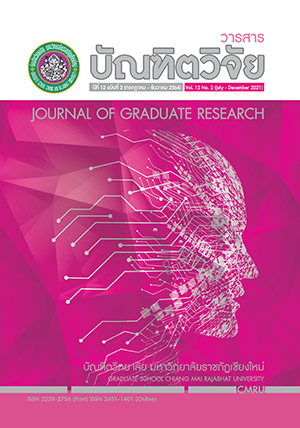Guidelines for Promoting Learning and Career Development of Nongpakrang Subdistrict Municipality
Main Article Content
Abstract
The objective of this research was to develop guidelines for learning promotion management and career development of Nongpakrang Subdistrict Municipality. Qualitative research was conducted using participatory action research techniques. The research population was community leaders, community committee, members of various groups set up in the community, and Nongpakrang Subdistrict Municipality’s personnel related to Vocational Learning Center, totaling 113 people. The key informant comprised of community leaders, community committee, members of various groups set up in the community, totaling 67 people. The techniques of purposive sampling and snowball sampling were implemented. Data was collected through in-depth interviews, focus group, parcipatory and non-parcipatory observation. The data was analyzed by inductive analysis, and the triangulation of data collection was done to examine the accuracy of information.
The research findings were that the guidelines for learning promotion management and career development of Nongpakrang Subdistrict Municipality include 1) team - based structure together with scope of work, authority, and assignments should be clearly defined and there should be representatives from different groups to join the committee, 2) plan for learning promotion and career development should be prepared by setting directions, goals, steps, methods of action, and plans or projects appropriate to the context of the community, 3) the implementation should be done following the plan for learning promotion and career development by organizing various activities to enhance or develop professional skills, 4) the follow-up and evaluation should be done after the completion of the project every three months for continual development, and 5) digital technology should be used to promote learning and career development in order to transfer knowledge and professional skills, and to help all people in the community able to access the knowledge more easily. In addition, they can apply the gained knowledge to increase their income for the family, leading to lifelong learning.
Downloads
Article Details

This work is licensed under a Creative Commons Attribution-NonCommercial-NoDerivatives 4.0 International License.
References
กรมส่งเสริมการปกครองท้องถิ่น. (ม.ป.ป.). มาตรฐานศูนย์การเรียนรู้ชุมชน. กรุงเทพฯ: กระทรวงมหาดไทย
คณะกรรมการอิสระเพื่อปฏิรูปการศึกษา. (2562). รายงานพันธกิจของคณะกรรมการอิสระเพื่อการปฏิรูปการศึกษา. สืบค้นจาก http://backoffice.onec.go.th/uploads/Book/1734-file.pdf
ณัฐดนัย เนียมทอง. (2561). มองเทคโนโลยีเพื่อการศึกษาในยุคดิจิทัล. กรุงเทพฯ: สถาบันส่งเสริมการสอนวิทยาศาสตร์และเทคโนโลยี (สสวท.).
ดมิศา มุกด์มณี และดวงมณี เลาวกุล. (2560). โครงการติดตามและประเมินผลการทำงานของคณะกรรมตรวจเงินแผ่นดิน.กรุงเทพฯ: สถาบันพระปกเกล้า.
นำศักดิ์ อุทัยศรีสม และสัมพันธ์ พลภักดิ์. (2560). การบริหารจัดการด้านการวางแผนขององค์การบริหารส่วนตำบลในจังหวัดปทุมธานี ตามแนวทางการบริหารกิจการบ้านเมืองที่ดี. วารสารวิชาการมหาวิทยาลัยอีสเทิร์นเอเชีย ฉบับสังคมศาสตร์และมนุษยศาสตร์, 7(2), 266-276.
นิติภรณ์ กลิ่นมาลี, อโนทัย ประสาน และสุรพงศ์ เอื้อศิริพรฤทธิ์. (2561). สภาพการปฏิบัติการวางแผนบริหารโรงเรียนเฉพาะความพิการ สังกัดสำนักบริหารงานการศึกษาพิเศษ จังหวัดนครศรีธรรมราช. วารสารบัณฑิตศึกษา, 15(70), 86-93.
ปิยนันท์ สวัสดิ์ศฤงฆาร. (2561). 7S model (McKinsey). สืบค้นจาก https://drpiyanan.com/2021/05/27/7s-model-mckinsey/
พงษ์พัต วัฒนพงศ์ศิริ และสุรีย์พร สลับสี. (2562). การจัดการเชิงกลยุทธ์ในการบริหารการจัดทำบริการสาธารณะขององค์กรปกครองส่วนท้องถิ่นในจังหวัดสมุทรปราการ. กรุงเทพฯ: มหาวิทยาลัยราชภัฏธนบุรี.
พระราชบัญญัติการศึกษาแห่งชาติ พ.ศ. 2542. (2542). ราชกิจจานุเบกษา, เล่มที่ 116 ตอนที่ 74 ก 19 สิงหาคม 2542 หน้า 1-23. สืบค้นจาก http://www.ratchakitcha.soc.go.th/DATA/PDF/2542/A/074/1.PDF
ศูนย์ทดสอบและประเมินเพื่อพัฒนาการศึกษาและวิชาชีพ. (ม.ป.ป.). หลักการติดตามและประเมินโครงการ. กรุงเทพฯ: คณะครุศาสตร์ จุฬาลงกรณ์มหาวิทยาลัย.
สนอง โลหิตวิเศษ. (2559). ชุมชนแห่งการเรียนรู้. สารานุกรมศึกษาศาสตร์ คณะศึกษาศาสตร์ มหาวิทยาลัยศรีนครินทรวิโรฒ, 51, 31-40.
สมบูรณ์ ศิริสรรหิรัญ. (2559). แนวทางการจัดตั้งศูนย์การเรียนรู้ชุมชนเพื่อการเรียนรู้ตลอดชีวิตสำหรับผู้สูงอายุ. วารสารการบริหารปกครอง, 5(2), 59 – 74.
สํานักงานคณะกรรมการดิจิทัลเพื่อเศรษฐกิจและสังคมแห่งชาติ. (2561). แผนพัฒนาดิจิทัลเพื่อเศรษฐกิจและสังคมระยะ 5 ป (พ.ศ. 2561 - 2565). กรุงเทพฯ: สํานักพิมพคณะรัฐมนตรีและราชกิจจานุเบกษา.
สำนักงานการศึกษานอกระบบ. (2555). แนวทางดำเนินโครงการศูนย์ฝึกอาชีพชุมชน. กรุงเทพฯ: สำนักงานปลัดกระทรวงศึกษาธิการ.
สำนักงานคณะกรรมการพัฒนาเศรษฐกิจและสังคมแห่งชาติ. (2560). สรุปสาระสำคัญแผนพัฒนา เศรษฐกิจและสังคมแห่งชาติ ฉบับที่ 12 2560-2564. สืบค้นจาก https://www.nesdc.go.th/ewt_news.php?nid=6420&filename=develop_issue
สำนักงานบริหารและพัฒนาองค์ความรู้ (องค์การมหาชน). (2563). การเรียนรู้ในยุคดิจิทัล. สืบค้นจาก https://www.okmd.or.th/okmd-opportunity/life-long-learning/3678/
สำนักงานปลัดกระทรวงเกษตรและสหกรณ์. (2564). การติดตามและประเมินผล. กรุงเทพฯ: สำนักงานปลัดกระทรวงเกษตรและสหกรณ์.
สำนักงานเลขาธิการสภาการศึกษา. (2562). มาตรฐานการศึกษาของชาติ พ.ศ. 2561. กรุงเทพฯ: บริษัท 21 เซนจูรี่ จำกัด.
อัจจิมา ศุภจริยาวัตร, สุรัติ สุพิชญางกูร และทักษญา สง่าโยธิน. (2562). รูปแบบโครงสร้างองค์การ การจัดการทรัพยากรมนุษย์ เทคโนโลยี และการจัดการที่ทำให้สินค้าโรงเรียนประชารัฐสามารถจัดจำหน่ายได้. Bu Academic Review, 18(1), 84-97.
Burton, R. M., and Obel, B. (2018). The science of organizational design: fit between structure and coordination. Journal of Organization Design, 7(5), 1-13. Retrieved from https://doi.org/10.1186/s41469-018-0029-2
Deming, W. E. (1986). Out of the crisis. Cambridge: MIT Press.
Godoy, R., and Bessas, C. (2020). Plan, do, check, act-a practical guide for managers: Understanding results-focused management. N.P.: Escola de Gestão Aquila.
Gošnik, D. (2019). Core business process management and company performance. Management, 14(1), 59-86.
Isniah, S., Purba, H. H., & Debora, F. (2020). Plan do check action (PDCA) method: literature review and research issues. Jurnal Sistem dan Manajemen Industri, 4(1), 72-81.
Kabeyi, M. J. B. (2019). Evolution of project management, monitoring and evaluation, with historical events and projects that have shaped the development of project management as a profession. International Journal of Science and Research, 8(12), 63-79.
Kuipers, B. S., and de Witte, M. C. (2005). The control structure of team-based organizations: A diagnostic model for empowerment. Economic and Industrial Democracy, 26(4), 621–643. Retrieved from https://doi.org/10.1177/0143831X05057504
Mohamed, W. K. (2019). Using plan, do, check, action (PDCA) cycle to evaluate a production project from a quality assurance (qa) perspective. (Doctoral dissertation, California State University Dominguez Hills).
Robbins, S. P. and Coulter, M. (2021). Management. (ed 15th). Harlow: Pearson.
Scherer, R., Siddiq, F., & Tondeur, J. (2019). The technology acceptance model (TAM): A meta-analytic structural equation modeling approach to explaining teachers’ adoption of digital technology in education. Computers & Education, 128, 13-35.
Spiteri, M., & Rundgren, S. N. C. (2020). Literature review on the factors affecting primary teachers’ use of digital technology. Technology, Knowledge and Learning, 25(1), 115-128.
Vera, N. T., & Suryanto, S. (2021). Competency development of quality control in automotive companies to improve service quality. STRADA Jurnal Ilmiah Kesehatan, 10(1), 385-391.
Wroblewski, M.T. (2020). The advantages of team-based structure. Retrieved from https://smallbusiness.chron.com/advantages-teambased-structure-55624.html
Yarbrough, D. B., Shula, L. M., Hopson, R. K., and Caruthers, F. A. (2010). The program evaluation standards: A guide for evaluators and evaluation users. (3rd ed). C.A.: Corwin Press.


